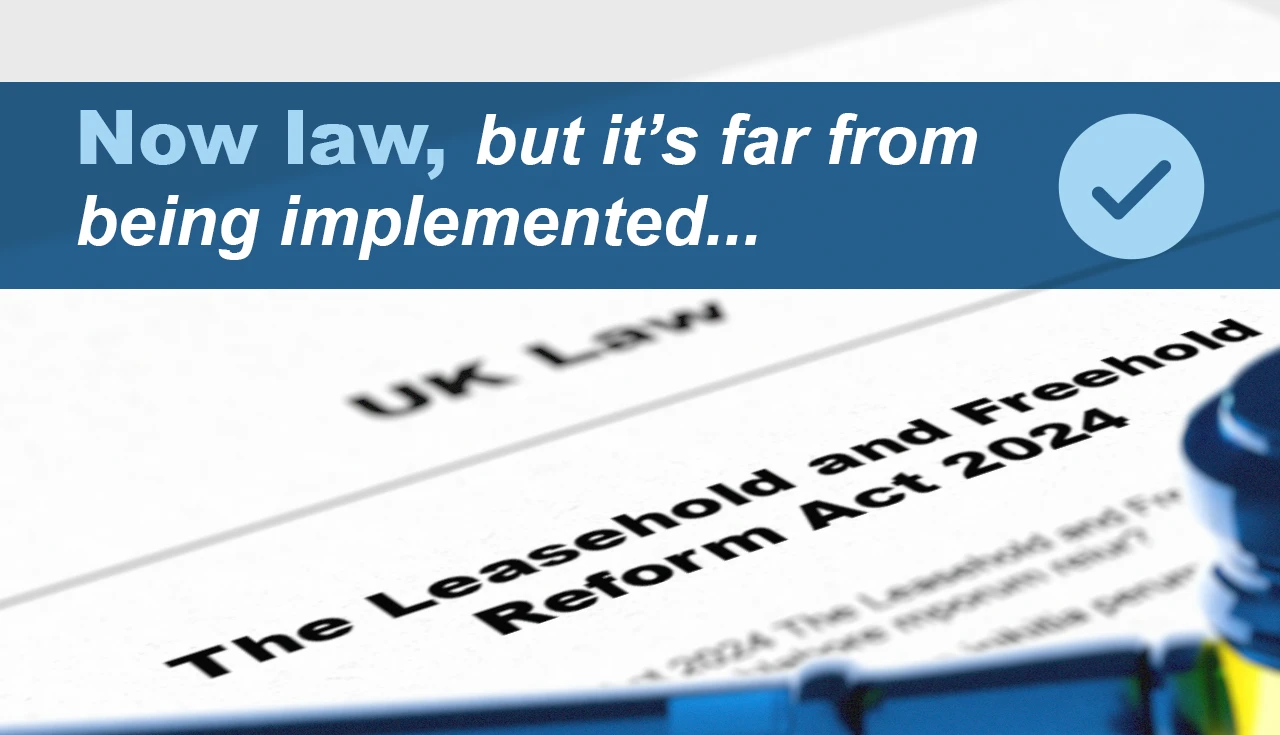The Leasehold and Freehold Reform Act (LAFRA) 2024 is now law, but is far from being fully implemented. In fact, the Government announced back in November 2024 that “serious flaws” in the legislation would require primary legislation to resolve. A draft Leasehold and Commonhold Reform Bill, promised in the second half of 2025, is still awaited.
What was the aim of the LAFRA?
To strengthen existing leaseholder rights and introduce new ones by:
- Making it cheaper for some leaseholders to extend their lease or buy their freehold. Those with flats and short leases could see a major reduction in costs, as the Act abolishes marriage value – though this key reform is being challenged in the courts.
- Increasing the standard lease extension term to 990 years – up from 50 years for houses and 90 years for flats – with ground rent reduced to zero.
- Banning the sale of new leasehold houses other than in exceptional circumstances.
- Giving leaseholders greater transparency over service charges and banning opaque and excessive buildings insurance commissions.
- Making it easier and cheaper for leaseholders to take over management of their building.
- Reducing costs for leaseholders to exercise enfranchisement rights, as in most cases, they will no longer have to pay their freeholder’s legal fees.
- Extending access to redress schemes for challenging poor practice.
- Making buying or selling a leasehold property quicker and easier by setting a maximum time and fee for leasehold home buying and selling information.
- Granting homeowners on private and mixed-tenure estates more rights of redress, including better information on charges and the ability to challenge their fairness.
- Scrapping the presumption that leaseholders cover freeholder legal costs when challenging poor practices.
Delayed progress and legal complexity
Despite receiving Royal Assent under the previous Government, over a year later, only a handful of provisions are in force. A legal challenge brought by major freeholders, including Grosvenor and charitable freeholder John Lyon’s Charity, adds further complexity to the proposed leasehold reform.
They argue that the changes, particularly those related to lease extension valuation, violate their rights under the European Convention on Human Rights (ECHR) by interfering with property rights and failing to offer adequate compensation. However, critics have pointed out the lack of leaseholder representation at the High Court hearing, arguing that the legal challenge could hinder vital reforms that leaseholders have long awaited.
What’s next for leasehold reform?
Although the Government has pledged to “bring the feudal leasehold system to an end,” this latest legal challenge could cause fresh delays. A High Court judgment is expected in the coming weeks and will influence the Government’s next move.
If the Government wins, it is likely to move quickly to implement reforms to lease extension calculations and finalise the abolition of marriage value. If the claimants succeed, parts of the Act will need to be amended, which could cause significant delays.
In either case, the court’s decision will determine the pace and scope of leasehold reform moving forward.
Looking ahead to commonhold and new reforms
A white paper has also been published confirming that the sale of new leasehold flats will be banned and commonhold homeownership will be “reinvigorated” under a new legal framework. A draft Leasehold and Commonhold Reform Bill, detailing how this will work, is expected later this year.
What’s actually changed so far?
Some reforms have already been enacted:
- The ‘two-year ownership rule’ for lease extension or freehold purchase has been scrapped.
- Right to Manage (RTM) reforms have expanded eligibility.
- The automatic obligation for leaseholders to pay freeholder legal fees has ended.
These changes help strengthen leaseholder empowerment and reduce legal and financial barriers to taking control of a building.
What has the Government committed to?
In a written statement to Parliament late last year, Housing Minister Matthew Pennycook set out the sequencing for the reforms, elements of which seem now to have slipped. The Government had intended to publish a consultation on valuation rates for lease extension (following the removal of marriage value) by summer 2025, but this has yet to materialise.










